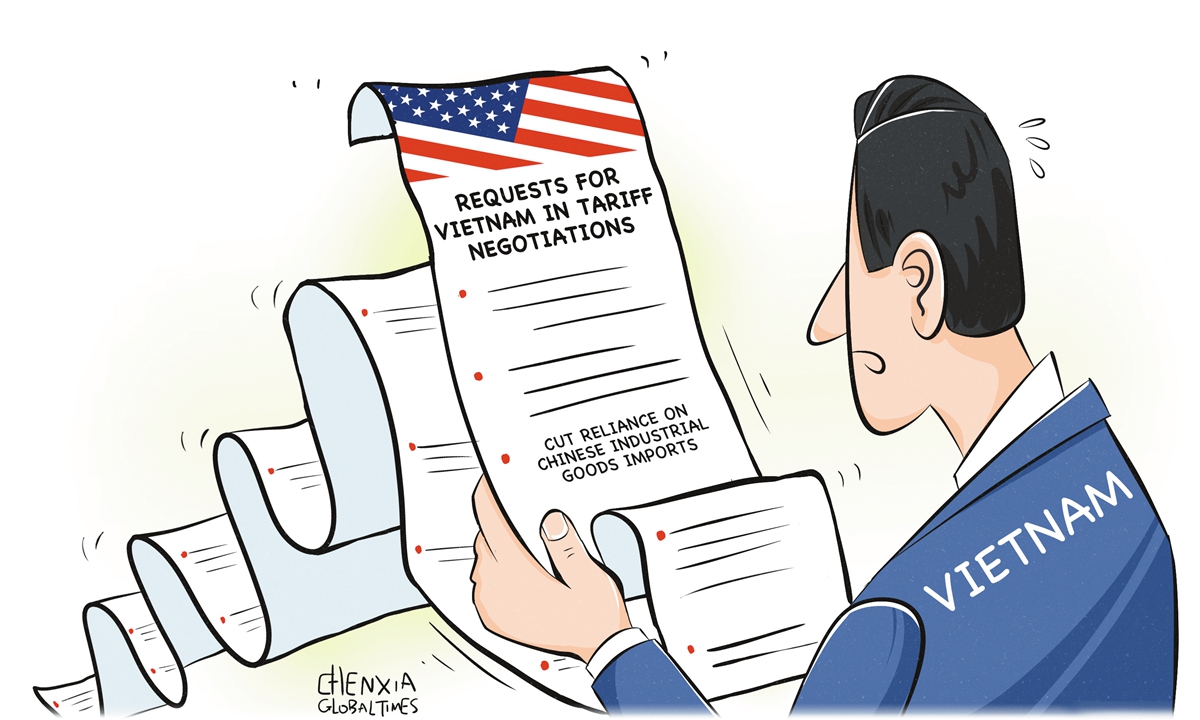Why countries shouldn’t bow to US attempt to include ‘poison pill’ clause in trade talks

Illustration: Chen Xia/GT
The US has sent a long list of "tough requests" to Vietnam in its tariff talks, including demands that could force the country to "cut its reliance" on imports of Chinese industrial goods, according to a recent Reuters report, citing sources familiar with the matter. However, this is not an isolated instance. After the US and the UK reached a trade deal in May, concerns were raised that the deal could be used to squeeze Chinese products out of British supply chains.
The US requests concerning China to Vietnam have been widely viewed as serving the strategic objectives of the US trade war against China. Ding Yifan, a senior fellow of the Institute of World Development under the State Council's Development Research Center, told the Global Times that these latest moves are reminiscent of the "poison pill" provision formally known as Article 32.10 of the US-Mexico-Canada Agreement, which aims to deter the signatories from entering into a free trade agreement with any "non-market country."
What we are seeing now is a "recycle attempt" of that highly exclusive - or, to be more specific, China-targeted - clause into Washington's ongoing trade negotiations, transforming what should be economic dialogues into geopolitical gambits. The intention is clear: Washington is attempting to entice other countries with its "mercy" on tariffs, essentially coercing them into following its lead in excluding China from global industrial and trade networks.
According to Li Haidong, a professor at China Foreign Affairs University, the trade and economic policies of countries like Vietnam should be guided by their own national interests, not Washington's strategic goals. When countries are compelled to reshape their trade relationships due to US pressure, it infringes on their sovereign rights to follow independent development paths. Yielding to US pressure is not in line with their practical economic interests.
Take Vietnam as a concrete example, a country that regards both the US and China as crucial trade partners. In particular, Vietnam's manufacturing has seen rapid growth in recent years thanks to raw materials and equipment from China. Under such circumstances, Washington's push for Hanoi to "reduce dependence" on Beijing is effectively forcing the Southeast Asian country to choose between two vital economic lifelines. Such a choice is not only politically fraught but economically perilous.
Trading sovereignty and long-term economic stability for short-term tariff relief from Washington is a poor choice. Worse still, the US "poison pill" clause risks undermining the entire global supply chain system, disrupting the cooperative architecture that has brought prosperity to much of the world over the past few decades and replacing multilateralism and win-win cooperation with zero-sum logic and "America First" unilateralism. That's what the world does not need in this moment of fragile global recovery.
China's position on this issue has been consistent and clear. It is firmly opposed to any party seeking a deal at the expense of China's interests and vows to respond as necessary should that situation arise. A spokesperson from China's Ministry of Commerce also stated: "Appeasement cannot bring peace, and compromise cannot earn respect. Upholding principles and fairness and justice is the correct way to safeguard one's own interests."
The world must not let itself be dragged along by the logic behind the US pursuit of a "poison pill" clause. Cooperation with China is an opportunity for countries seeking development. In a world of deep interdependence and complex global challenges, it's wise for forward-thinking nations to stand on the side of openness, fairness and multilateral rules - not fall into the trap of isolationism, self-harm and great-power confrontation. Otherwise, the short-term gains from compromising to US could easily become long-term liabilities.

